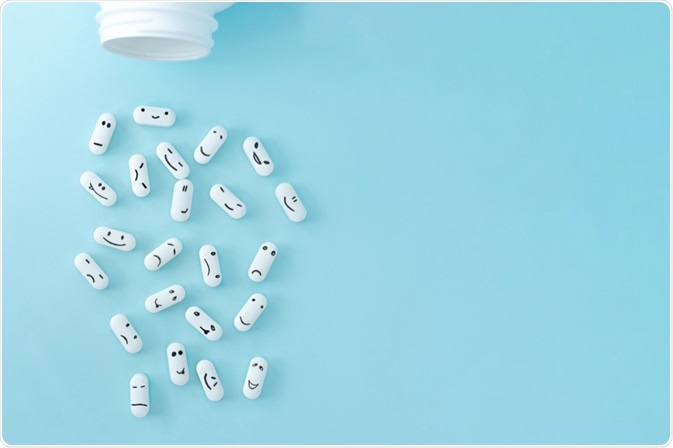
Do Serotonin and Antidepressants Affect the Microbiome?
The gut microbiota is a collection of about 100 trillion bacteria and other microbes that reside in the intestine of the human body. Studies indicate that the gut microbiota can be significantly affected by antidepressants that target a neurotransmitter called serotonin.
 Image Credit: Yuliya Apanasenko / Shutterstock.com
Image Credit: Yuliya Apanasenko / Shutterstock.comWhat is serotonin?
Serotonin, also known as 5-hydroxytryptamine (5-HT), is a vital neurotransmitter that maintains a bidirectional cross-talk between the brain and the gastrointestinal (GI) tract. Serotonin, which is synthesized from the amino acid tryptophan, is mostly produced in enterochromaffin cells of the gut.
It represents most of the serotonin present in the blood. In addition, serotonin is synthesized in serotonergic neurons present in the brainstem.
The brain-derived serotonin plays important roles as a neurotransmitter in modulating a variety of neurological functions, including circadian rhythm, neuroendocrine activity, social and sexual behaviors, feeding, mood, cognition, and memory.
Any impairment in serotonin homeostasis can result in neurological and psychological disorders, such as depression, anxiety, mood swinging, sexual dysfunction, and cognitive deficits.
On the other hand, gut-derived serotonin, which comprises about 90% of the body’s total pool of serotonin, acts as a hormone in regulating many important physiological processes, including synthesis and differentiation of hematopoietic cells, gut immunity, lipolysis, gluconeogenesis, platelet function, etc.
Can serotonin modulate the gut’s microbiota?
The synthesis of gut-derived serotonin in enterochromaffin cells is regulated by indigenous spore-forming bacteria, particularly Turicibacter sanguinis and Clostridia, that are present in the human microbiota.
The production of serotonin is reduced by more than 50% when these bacteria are absent in the gut. The bacteria-induced increase in serotonin concentration is responsible for modulating many physiological functions, such as GI tract motility and platelet activity.
Similarly, gut-derived serotonin plays an important role in regulating the abundance of spore-forming bacteria that are required for serotonin biosynthesis. Among the serotonin-regulated bacterial population, Turicibacter sanguinis expresses a neurotransmitter called sodium symporter-related protein, which shares structural and sequence similarity with mammalian serotonin transporter.
With the help of these transporter proteins, Turicibacter sanguinis imports serotonin into the cells, which subsequently facilitates bacterial colonization in the GI tract.
On the other hand, the presence of antidepressants in the system, which generally function by inhibiting mammalian serotonin transporter, can significantly reduce the uptake of serotonin by the bacteria, leading to a substantial reduction in bacterial growth in the GI tract.
This unique communication between the bacteria and the host’s cellular components defines the underlying mechanism of regulation of gut microbiota by antidepressants.
How are antidepressants associated with gut microbiota?
There is a wide range of evidence suggesting that the gut’s microbiota significantly affects many neurological functions, including depressive behavior. For example, gut bacteria are known to regulate stress response, anxiety, and social behavior, in addition to regulating neurotransmitter levels in different brain regions.
The association between gut microbiota and mood disorders is established by the observation that patients suffering from depression show a different diversity and composition of gut bacteria in comparison to their healthy counterparts.
Antidepressants that mainly inhibit serotonin transporter and increase the synaptic concentration of serotonin are known to partially mediate their actions by altering the gut’s microbiota. In this context, one recent study has demonstrated that the treatment of mice with various antidepressants reduces the number of certain gut bacteria (Ruminococcus flavefaciens and Adlercreutzia equolifaciens) and increases their beta diversity.
In contrast, mice supplemented with Ruminococcus flavefaciens show attenuated anti-depression effects. Further experimental evidence shows that Ruminococcus flavefaciens nullifies the effects of antidepressants by increasing the expression of mitochondrial oxidative phosphorylation pathway genes and decreasing the expression of neuronal plasticity-related genes.
Sources
- Science Direct. 2017. Serotonin. https://www.sciencedirect.com/topics/medicine-and-dentistry/serotonin
- Fung TC. 2019. Intestinal serotonin and fluoxetine exposure modulate bacterial colonization in the gut. Nature Microbiology. https://www.nature.com/articles/s41564-019-0540-4
- Lukic I. 2019. Antidepressants affect gut microbiota and Ruminococcus flavefaciens is able to abolish their effects on depressive-like behavior. Translational Psychiatry. https://www.nature.com/articles/s41398-019-0466-x
- Yano JM. 2015. Indigenous bacteria from the gut microbiota regulate host serotonin biosynthesis. Cell. https://www.ncbi.nlm.nih.gov/pmc/articles/PMC4393509/
Further Reading
Last Updated: Nov 21, 2019

































No hay comentarios:
Publicar un comentario